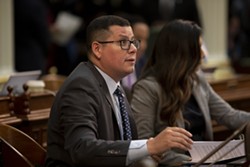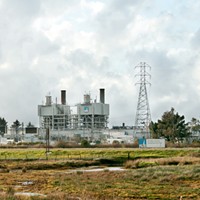Tuesday, February 23, 2021
Who Will Pay for All of California's Unemployment Fraud?
Posted By Lauren Hepler/CalMatters and Stephen Council, CalMatters on Tue, Feb 23, 2021 at 6:34 AM
A 1-year-old in Fresno raking in $167 a week. An ex-state employee stealing $200,000 from California’s unemployment system, some by impersonating Sen. Dianne Feinstein. Another $1.2 million swindled by a rapper who bragged about it on YouTube, $1 billion drained in the name of state prisoners, and $2 billion in jobless benefits siphoned off state-issued debit cards.
If doing the math on unemployment fraud in California during the pandemic isn’t dizzying enough, add the untold numbers of workers still fighting for funds that they say were stolen in unauthorized transactions at faraway ATMs, casinos and convenience stores.
“You’ve already been robbed once, and now it feels like they’re doing it again,” said Kori Chase, a 60-year-old housekeeper in Humboldt County living in her car while she tries to claw back more than $3,000 from state unemployment payment contractor Bank of America. “I feel like I’ve been thrown in the sewer, pretty much.”
The state is just beginning to tally how much of the $110 billion paid out in unemployment since March has disappeared in what law enforcement officials say is the biggest fraud investigation in California history.
As the state’s own unemployment fund falls deeper into debt and Congress finalizes a new stimulus bill to restart $300-a-week supplemental payments, a battle is already underway over whether taxpayers might ultimately be asked to pick up the tab for fraud.
Some argue that the fraud panic has already swung too far toward criminalizing out-of-work Californians caught up in crackdowns this fall, when the state Employment Development Department temporarily stopped processing claims and some 350,000 debit cards were cutoff.
But federal officials warn that 1 in 10 unemployment insurance dollars paid during the pandemic could be linked to fraud, which in California would total some $11 billion — more than the state spends annually on community colleges, workforce development and homelessness. “
About 10 percent of UI payments are improper under the best of times,” Scott Dahl, former inspector general of the U.S. Department of Labor, told Congress this summer. “And we are in the worst of times.”
Now, fraud losses are poised to collide with a state unemployment system in financial free fall. In less than a year, California’s Unemployment Insurance fund bankrolled by employer payroll taxes has gone from a surplus of $3 billion to a projected $48 billion deficit by 2021. That’s even after the federal government stepped in during the pandemic to fund benefits for contract workers and provide temporary $600 and $300 weekly supplemental payments.
If doing the math on unemployment fraud in California during the pandemic isn’t dizzying enough, add the untold numbers of workers still fighting for funds that they say were stolen in unauthorized transactions at faraway ATMs, casinos and convenience stores.
“You’ve already been robbed once, and now it feels like they’re doing it again,” said Kori Chase, a 60-year-old housekeeper in Humboldt County living in her car while she tries to claw back more than $3,000 from state unemployment payment contractor Bank of America. “I feel like I’ve been thrown in the sewer, pretty much.”
The state is just beginning to tally how much of the $110 billion paid out in unemployment since March has disappeared in what law enforcement officials say is the biggest fraud investigation in California history.
As the state’s own unemployment fund falls deeper into debt and Congress finalizes a new stimulus bill to restart $300-a-week supplemental payments, a battle is already underway over whether taxpayers might ultimately be asked to pick up the tab for fraud.
Some argue that the fraud panic has already swung too far toward criminalizing out-of-work Californians caught up in crackdowns this fall, when the state Employment Development Department temporarily stopped processing claims and some 350,000 debit cards were cutoff.
But federal officials warn that 1 in 10 unemployment insurance dollars paid during the pandemic could be linked to fraud, which in California would total some $11 billion — more than the state spends annually on community colleges, workforce development and homelessness. “
About 10 percent of UI payments are improper under the best of times,” Scott Dahl, former inspector general of the U.S. Department of Labor, told Congress this summer. “And we are in the worst of times.”
Now, fraud losses are poised to collide with a state unemployment system in financial free fall. In less than a year, California’s Unemployment Insurance fund bankrolled by employer payroll taxes has gone from a surplus of $3 billion to a projected $48 billion deficit by 2021. That’s even after the federal government stepped in during the pandemic to fund benefits for contract workers and provide temporary $600 and $300 weekly supplemental payments.
With the new stimulus bill in Washington poised to flood the strained system with more cash, the coming weeks will test whether the state can strike a balance between paying benefits out quickly and securely. It’s a challenge that increasingly pits the Employment Development Department against its own payment contractor, Bank of America.
Experts say any state missteps could prove costly for the public, despite a 2010 contract with the bank that states that the agency “shall not be liable for overdrafts, fraud, misuse, and lost or stolen debit cards.”
“If it turns out that California should not have approved all these claims,” said Mason Wilder, a research specialist at the Association of Certified Fraud Examiners, “then regardless of what their agreement says with Bank of America about debit cards, I would think that ultimately the taxpayers are going to be on the hook for California’s errors.”
A web of fraud
Experts say any state missteps could prove costly for the public, despite a 2010 contract with the bank that states that the agency “shall not be liable for overdrafts, fraud, misuse, and lost or stolen debit cards.”
“If it turns out that California should not have approved all these claims,” said Mason Wilder, a research specialist at the Association of Certified Fraud Examiners, “then regardless of what their agreement says with Bank of America about debit cards, I would think that ultimately the taxpayers are going to be on the hook for California’s errors.”
A web of fraud
Unemployment fraud is not new. “Imposter fraud,” or using someone else’s personal information to apply for benefits, has been a threat since the days when unemployment was paid out of cash boxes at local field offices. From the 1960s to 2010, paper checks had their own vulnerabilities.
With California’s current system almost solely reliant on prepaid Bank of America debit cards, officials must keep up with a widening array of fraud: forged online applications, large batches of debit cards ordered to central drop houses, intercepted mail, social media scams, debit card skimming and more.
In recent years, the state’s “improper payment” rate has hovered around 8 percent. Much of the fraud anxiety in the COVID-19 era revolves around the Pandemic Unemployment Assistance program, better known as PUA, created by the federal government’s $2 trillion spring stimulus package. The program aimed to quickly establish a safety net for self-employed and contract workers shut out of traditional unemployment, but its rushed application process relied on applicants self-certifying their eligibility.
“Thieves took advantage of a desperate situation and exploited it beyond belief,” said Sacramento District Attorney Anne Marie Schubert.
With California’s current system almost solely reliant on prepaid Bank of America debit cards, officials must keep up with a widening array of fraud: forged online applications, large batches of debit cards ordered to central drop houses, intercepted mail, social media scams, debit card skimming and more.
In recent years, the state’s “improper payment” rate has hovered around 8 percent. Much of the fraud anxiety in the COVID-19 era revolves around the Pandemic Unemployment Assistance program, better known as PUA, created by the federal government’s $2 trillion spring stimulus package. The program aimed to quickly establish a safety net for self-employed and contract workers shut out of traditional unemployment, but its rushed application process relied on applicants self-certifying their eligibility.
“Thieves took advantage of a desperate situation and exploited it beyond belief,” said Sacramento District Attorney Anne Marie Schubert.
Last month, a new law enforcement task force chaired by Schubert warned Gov. Gavin Newsom that fraud linked to state inmates alone may hit $1 billion.
The task force is now attempting to curb fraud by working with the Employment Development Department, which employs only 17 dedicated investigators, plus the California Department of Corrections and other state agencies brought into the fold by Newsom.
“The only way to get our hands around this in an efficient way is to do something like this,” Schubert said.
Law enforcement officials and security consultants emphasize potential links between unemployment fraud and organized rings looking to bankroll serious crimes like human trafficking, drug dealing or gun smuggling. But other analysts say it’s important to keep out-of-work claimants from being overshadowed by fraud, and to distinguish less sophisticated identity theft that could be detected relatively easily by better monitoring social media, foreign IP addresses and identity documents submitted by unemployment applicants.
A September report by a governor-appointed “strike team” criticized the Employment Development Department’s “culture of allowing fear for fraud to trump all other considerations,” while still failing to catch fraud.
“This is an unprecedented period for benefit fraud activity across the country,” the employment agency said in a statement. “At this time, we are unable to provide any estimates on total fraud activity during this pandemic due to an analysis effort still underway to verify identities on suspect claims.”
The new stimulus bill would give states discretion in how to distribute additional federal benefits. A provision grants states authority to claw back pandemic aid, but at the same time, waives repayment if fraud wasn’t the recipient’s fault.
Ultimately, the buck stops with Newsom, who will be judged on how he steers the state through its unemployment crisis.
A financial battle begins
While fraud targeting state unemployment enrollment systems is a widespread concern, it doesn’t explain the problems of people like Kori Chase, who have experienced issues directly with their state-issued debit cards.
Up until October, she thought the odd charges she’d seen over the summer at places she hadn’t visited had been resolved, since the money was credited to her account. But just before Chase paid her October rent, her balance plummeted to negative $3,000.
Bank of America had reversed the fraud credit, she said, leaving her unable to pay $530 for her room in McKinleyville. She hasn’t been able to get the money back since.
“How long do they expect you to just be out here in limbo?” Chase said in mid-December from the silver Chrysler she now shares with her chihuahua. “Don’t they get it? I mean, it’s survival.”
Bank of America declined to comment on how many California unemployment accounts have seen fraud credits reversed, though dozens have shared similar stories and documentation with CalMatters.
A spokesman said the bank has unfrozen some 54,000 accounts after jobless cardholders appealed disputes, and that the “vast majority” of fraud appears related to state enrollment processes.
The Employment Development Department told CalMatters that “Bank of America assesses potential fraudulent charges” involving debit cards.
At the state Capitol, some staffers attempting to remedy constituents’ unemployment woes have grown frustrated with what they say is a lack of cooperation from the bank, aside from a five-page letter sent in response to a letter to Bank of America CEO Brian Moynihan from more than 50 state lawmakers.
They question how the bank is flagging accounts for fraud, and whether there are parallels between problems in California and other states with Bank of America unemployment payment contracts, including Arizona and Maryland.
Overhauling unemployment?
The more than 17 million unemployment claims that California’s Employment Development Department has processed since March far exceeds the demand for benefits the state has seen in any other recession. Still, security pitfalls weren’t hard to see coming. The state auditor reported last month that the agency mailed some 38 million letters with Social Security numbers during the pandemic, despite previous calls to stop.
The vulnerabilities have been compounded during the pandemic by large infusions of federal cash with PUA payments and $300-600 weekly supplements. Though many workers badly need the money, it’s doubled as a lure for fraud that could undermine the future of the state’s cash-strapped unemployment fund.
Assemblymember Rudy Salas, a Democrat from Bakersfield, said law
The task force is now attempting to curb fraud by working with the Employment Development Department, which employs only 17 dedicated investigators, plus the California Department of Corrections and other state agencies brought into the fold by Newsom.
“The only way to get our hands around this in an efficient way is to do something like this,” Schubert said.
Law enforcement officials and security consultants emphasize potential links between unemployment fraud and organized rings looking to bankroll serious crimes like human trafficking, drug dealing or gun smuggling. But other analysts say it’s important to keep out-of-work claimants from being overshadowed by fraud, and to distinguish less sophisticated identity theft that could be detected relatively easily by better monitoring social media, foreign IP addresses and identity documents submitted by unemployment applicants.
A September report by a governor-appointed “strike team” criticized the Employment Development Department’s “culture of allowing fear for fraud to trump all other considerations,” while still failing to catch fraud.
“This is an unprecedented period for benefit fraud activity across the country,” the employment agency said in a statement. “At this time, we are unable to provide any estimates on total fraud activity during this pandemic due to an analysis effort still underway to verify identities on suspect claims.”
The new stimulus bill would give states discretion in how to distribute additional federal benefits. A provision grants states authority to claw back pandemic aid, but at the same time, waives repayment if fraud wasn’t the recipient’s fault.
Ultimately, the buck stops with Newsom, who will be judged on how he steers the state through its unemployment crisis.
A financial battle begins
While fraud targeting state unemployment enrollment systems is a widespread concern, it doesn’t explain the problems of people like Kori Chase, who have experienced issues directly with their state-issued debit cards.
Up until October, she thought the odd charges she’d seen over the summer at places she hadn’t visited had been resolved, since the money was credited to her account. But just before Chase paid her October rent, her balance plummeted to negative $3,000.
Bank of America had reversed the fraud credit, she said, leaving her unable to pay $530 for her room in McKinleyville. She hasn’t been able to get the money back since.
“How long do they expect you to just be out here in limbo?” Chase said in mid-December from the silver Chrysler she now shares with her chihuahua. “Don’t they get it? I mean, it’s survival.”
Bank of America declined to comment on how many California unemployment accounts have seen fraud credits reversed, though dozens have shared similar stories and documentation with CalMatters.
A spokesman said the bank has unfrozen some 54,000 accounts after jobless cardholders appealed disputes, and that the “vast majority” of fraud appears related to state enrollment processes.
The Employment Development Department told CalMatters that “Bank of America assesses potential fraudulent charges” involving debit cards.
At the state Capitol, some staffers attempting to remedy constituents’ unemployment woes have grown frustrated with what they say is a lack of cooperation from the bank, aside from a five-page letter sent in response to a letter to Bank of America CEO Brian Moynihan from more than 50 state lawmakers.
They question how the bank is flagging accounts for fraud, and whether there are parallels between problems in California and other states with Bank of America unemployment payment contracts, including Arizona and Maryland.
Overhauling unemployment?
The more than 17 million unemployment claims that California’s Employment Development Department has processed since March far exceeds the demand for benefits the state has seen in any other recession. Still, security pitfalls weren’t hard to see coming. The state auditor reported last month that the agency mailed some 38 million letters with Social Security numbers during the pandemic, despite previous calls to stop.
The vulnerabilities have been compounded during the pandemic by large infusions of federal cash with PUA payments and $300-600 weekly supplements. Though many workers badly need the money, it’s doubled as a lure for fraud that could undermine the future of the state’s cash-strapped unemployment fund.
Assemblymember Rudy Salas, a Democrat from Bakersfield, said law
makers don’t yet know how much unemployment money is missing, let alone whether it came from state or federal coffers. He’s awaiting a broader state audit in January, then will come the tougher question: “How do we backfill that?” said Salas, who has introduced one of several unemployment reform bills, AB 56, that the Legislature is set to take up next year.
As new virus closures once again swell the state’s unemployment backlog, competing priorities are emerging in the onslaught of new reform bills. Republicans have seized on unemployment dysfunction to rail against bureaucratic mismanagement and Newsom’s leadership, while Democrats are introducing more incremental bills to tweak the system.
“We’ve got a lot of messes to clean up,” said Democratic Assemblymember Lorena Gonzalez, who introduced bill AB 47 to require the state to offer a direct deposit option for unemployment, in line with 47 other states. “Ultimately, we do have to make people whole.”
Assemblymember Jim Patterson, a Republican from Fresno, describes the employment agency as a “rats nest of incompetence.” Patterson made the remark in a press conference where he attacked the state’s much-touted new ID.me automated verification system, citing constituents still stuck waiting months for benefits after promised improvements.
In the meantime, states like Washington have already recovered hundreds of millions of dollars after fraud — something Wilder of the Association of Certified Fraud Examiners said could prove much more difficult with California’s scattershot fraud issues.
“Especially if it’s just one-off cases, a bunch of individuals, that means you can’t find somebody that put through a thousand fraudulent claims,” Wilder said. “That’s a thousand separate investigations that the state is going to have to deal with.”
As new virus closures once again swell the state’s unemployment backlog, competing priorities are emerging in the onslaught of new reform bills. Republicans have seized on unemployment dysfunction to rail against bureaucratic mismanagement and Newsom’s leadership, while Democrats are introducing more incremental bills to tweak the system.
“We’ve got a lot of messes to clean up,” said Democratic Assemblymember Lorena Gonzalez, who introduced bill AB 47 to require the state to offer a direct deposit option for unemployment, in line with 47 other states. “Ultimately, we do have to make people whole.”
Assemblymember Jim Patterson, a Republican from Fresno, describes the employment agency as a “rats nest of incompetence.” Patterson made the remark in a press conference where he attacked the state’s much-touted new ID.me automated verification system, citing constituents still stuck waiting months for benefits after promised improvements.
In the meantime, states like Washington have already recovered hundreds of millions of dollars after fraud — something Wilder of the Association of Certified Fraud Examiners said could prove much more difficult with California’s scattershot fraud issues.
“Especially if it’s just one-off cases, a bunch of individuals, that means you can’t find somebody that put through a thousand fraudulent claims,” Wilder said. “That’s a thousand separate investigations that the state is going to have to deal with.”
Speaking of...
Comments
Showing 1-1 of 1
Readers also liked…
More by Lauren Hepler/CalMatters
-
Is California Blowing it on Unemployment Reform?
- Mar 30, 2021
-
'Kickback Scheme'
How EDD and Bank of America make millions on California unemployment
- Feb 11, 2021
-
How EDD, Bank of America Make Millions on California Unemployment
- Feb 6, 2021
- More »



































